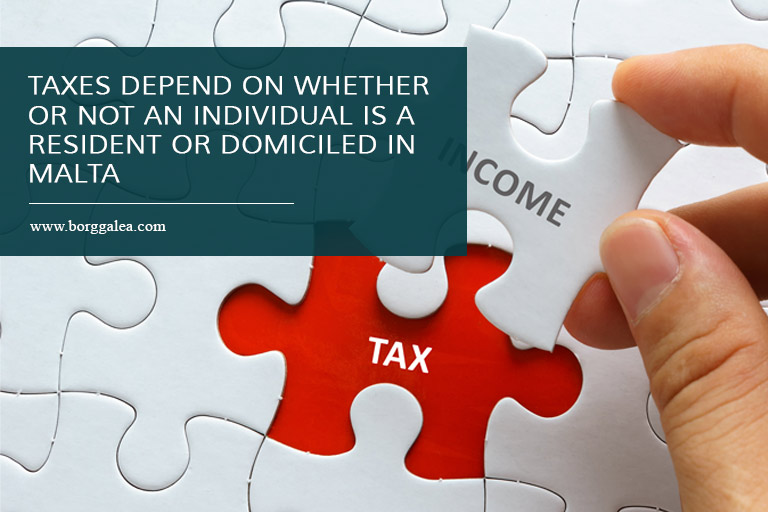Navigating taxation laws can be challenging, especially when income is incurred outside of Malta. The taxability of an individual or company in Malta is determined by their residence and domicile. In this article, we will explain how income incurred outside of Malta is taxed and the relief available to avoid double taxation.
Malta Taxes on Worldwide Income

An individual who is ordinarily resident and domiciled in Malta is subject to tax on their worldwide income, including income derived outside of Malta. Likewise, a company incorporated in Malta is considered to be resident and domiciled in Malta and is subject to tax on its worldwide income and capital gains. However, if an individual is not ordinarily resident or domiciled in Malta, they will only be subject to tax on any income and capital gains arising in Malta and on any income arising outside of Malta if it is received in Malta.
Similarly, if a company is a resident in Malta but not domiciled in Malta, it will be subject to income and capital gains arising in Malta and on income (but not capital gains) arising outside Malta, provided that the income is received in Malta.
Double Taxation Relief
More often than not, income arising outside Malta would have already been subject to tax by foreign tax jurisdictions. The phenomenon of double taxation has long been recognised as being a significant obstacle to the development of cross-border trade and investment. To overcome this, countries may enter into reciprocal double taxation agreements or treaties.
The main purpose of such treaties is to allocate the taxing rights between the countries concerned, and this is achieved through a mutual agreement between them, whereby one of the countries gives up some or all the tax that it would have been entitled to, in the absence of the treaty, by applying double taxation relief.
Malta has entered into double taxation treaties with over 70 countries, including most of the major European trading nations, which are all based on the OECD model.
Double Tax Treaty Relief
Double Tax Treaty Relief is provided in terms of the double tax treaties which Malta has concluded with various countries. Such treaty relief is generally given using the credit method, whereby the tax paid in the foreign country relating to income being taxed in Malta is allowed as a credit against the tax due in Malta.
Commonwealth Relief
Commonwealth Relief is only available where no double taxation treaty is in force between Malta and the respective Commonwealth country. However, its applicability depends on whether the respective Commonwealth country provides reciprocal tax treaty relief. This relief is not applicable to the United Kingdom.
Unilateral Relief
In 1994, through amendments to the Income Tax Act (through the addition of Articles 79 to 88), Unilateral Relief became available. This relief is available to both individuals resident in Malta and companies registered in Malta.
Unilateral Relief provides relief for tax suffered in another country where Malta does not have a double taxation treaty with that country. The foreign tax paid is allowed to be set off against tax payable in Malta on the foreign taxed income, but the amount of foreign tax allowed to be set off cannot exceed the Malta tax payable.
To claim Unilateral Relief, the taxpayer must have adequate documentary evidence of the tax paid abroad, as this may be requested by the Commissioner for Revenue.
Flat-Rate Foreign Tax Credit (FRFTC)

The Flat-Rate Foreign Tax Credit (FRFTC) is only available to companies, which are specifically empowered to receive foreign-sourced income or gains that fall to be allocated to their Foreign Income Account (FIA).
The FRFTC is granted through a tax credit of 25% of the foreign income or gains received by the company claiming such FRFTC net of any foreign tax, but before any deductions are made from such income. The FRFTC tax credit is limited to 85% of the Malta tax due on the foreign income.
To apply for this relief, the company must submit an application to the Commissioner for Revenue, along with a statement of the income received and the foreign tax paid on that income. The application must be submitted within 12 months from the end of the accounting period to which the income and foreign tax relate.
In addition, companies must also maintain proper records and documentation to support their claim for the FRFTC. This includes records of the foreign income received, the foreign tax paid on that income, and any deductions made from that income. Failure to maintain proper records can result in the denial of the FRFTC and the imposition of penalties.
In addition to double taxation relief, there are also other ways to reduce the tax burden on income earned outside Malta. For example, there are a number of deductions and exemptions available under the Maltese tax system, which can be used to reduce the taxable income of individuals and companies.
For instance, individuals may be eligible for a deduction for expenses related to their employment or business, such as travel expenses, professional fees, and insurance premiums. In addition, there are also a number of exemptions available for income earned from certain sources, such as income from patents, copyrights, and trademarks.
For companies, there are a number of deductions available for business expenses, including research and development costs, employee training, and advertising expenses. There are also a number of exemptions available for income earned from certain sources, such as dividends received from a subsidiary.
It is important to note that while there are a number of tax reliefs available to individuals and companies, it is important to ensure that all requirements are met and all documentation is in order to avoid any potential issues with the tax authorities.
In conclusion, if you have incurred tax outside Malta, there are a number of ways to
reduce your tax burden, including double taxation relief, deductions, and exemptions. By taking advantage of these opportunities, you can help to ensure that you are only paying the taxes that you are legally required to pay, and can keep more of your hard-earned money in your pocket. However, it is important to ensure that all requirements are met and that you have all the necessary documentation in order to avoid any potential issues with the tax authorities.
For advice on Malta company tax rate and other accounting information, contact Borg Galea & Associates. We are trusted accountants in Malta. Call us today at + 356 27037012.




